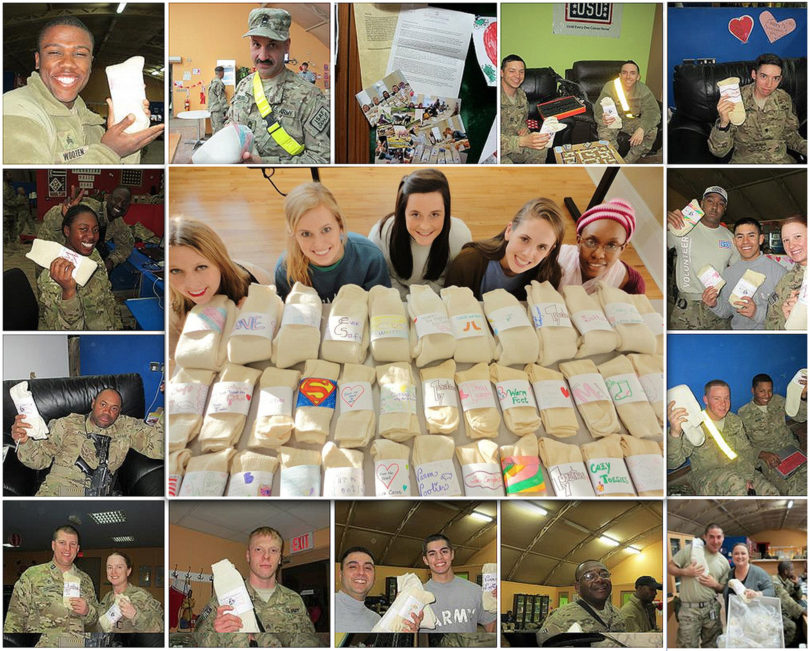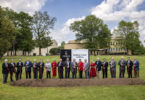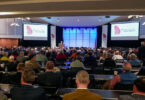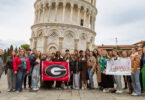Some things seem to get more important farther away from home. For soldiers fighting in Afghanistan, one of those is warm, dry socks.
Students, faculty and Extension specialists in the College of Family and Consumer Sciences worked with a Georgia sheep farmer to make sure service members have high-quality wool socks to get them through the end of the Afghan winter.
Fashion merchandising students sent a box containing about 100 pairs of the wool socks to soldiers serving in Afghanistan, where nights can dip below zero degrees Fahrenheit in some areas. The socks arrived at Bagram Air Field in February and “were going like hotcakes,” according to a USO representative.
“Being a fashion merchandising major, you don’t think that there are going to be a lot of opportunities to help reach out into the community,” said Lauren Joost, a senior from Washington, D.C. “The combination of working with textiles and helping the troops made this project something I really wanted to help with.”
Extension specialist Sharon Gibson, who helped to coordinate the effort, hopes the socks-to-soldiers effort will help students make the connection between agriculture and fashion, while helping build the public’s appreciation of farmers and members of the U.S. armed forces.
The socks that Joost and her classmates sent to Afghanistan are the product of a longtime collaboration between Gibson, Madison County Extension agent Adam Speir, senior fashion merchandising lecturer Emily Blalock, UGA textile scientist Patti Annis and Gwen Hustvedt from Texas State University in San Marcos.
Hustvedt’s research—some of which she conducted in Athens—focused on local wool, product development and marketing. She wanted to find out if there was a consumer preference for goods made from locally grown fibers.
Hustvedt’s search for locally grown wool in Athens eventually led her to Madison County sheep farmer Jan Southers.
Southers and her husband, Cornel Kittell, have a flock of 60 Gulf Coast sheep that they harvest wool from once a year. They usually sell most of the wool to a fiber broker in Tennessee. In 2010, she sold some of her wool to Hustvedt for the marketing study. As part of her study, Hustvedt also had socks made from wool grown in Texas and Virginia, which left her with an abundance of socks.
When Hustvedt met Gibson at an International Federation for Home Economics meeting, she ultimately found a home for her supply of socks.
“She asked if I thought there was something we could do with the 100-plus pairs of socks she had,” Gibson said. “I told her that I had a student who was working with the USO, that we had a great faculty member who was interested in women entrepreneurs and that I would work on it when I got back to Georgia.”
They hatched a plan to send the socks to a former UGA student in the College of Family and Consumer Sciences who worked as the duty manager for the USO at Bagram, and she would distribute the socks.
The Gaines Elementary School Sewing Club in Athens volunteered to make one-of-a-kind labels for each pair of socks.
Southers feels a close connection to the soldiers whose feet she’s helping to keep warm. Her husband is retired from the U.S. Army, and her younger daughter enlisted in the Georgia National Guard and currently is going through the Army’s basic training. Southers’ older-daughter’s boyfriend is a U.S. Marine.
“We have a lot of ties to the military, so when they told us about our socks going to Afghanistan, I thought that was great,” Southers said. “The fact our wool was going to be something nice for American soldiers meant a lot.”
Gibson made sure a few pairs of socks ended up in Annis’ UGA textile testing lab. Annis’ students are making a series of videos of them putting the socks through their paces-testing for things like durability.
They will post the videos on the UGA Socks for Soldiers Facebook page (www.facebook.com/ifsockscouldtalk) in an effort to spark conversations with the deployed soldiers who receive the socks.
The Facebook page also shows soldiers in Afghanistan receiving the socks.
“In the end, this is not just about socks. This is about making connections. It is about having students who are interested in fashion understanding their dependence on agriculture,” Gibson said. “It is about preserving what we say that we value—demonstrating our appreciation of farmers, service members and military families. It is about recognizing the thread that connects us—both figuratively and, in this case, literally.”








